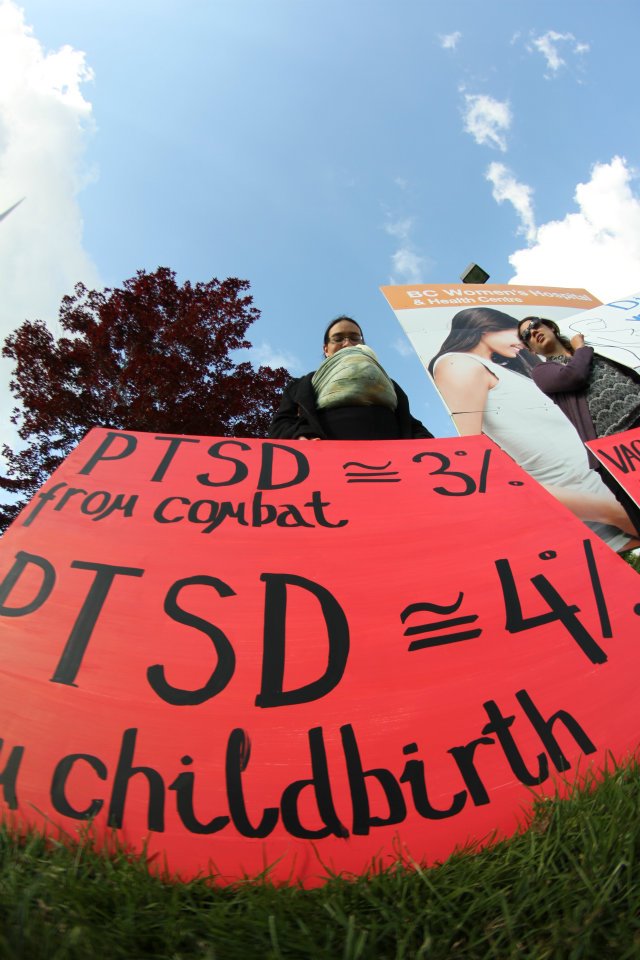There has been increasing awareness lately about childbirth-related PTSD. The National Post published an article on Sept 27th called “Childbirth can be as stressful as war“. This article refers to a study that indicated 1 in 13 women experience PTSD after childbirth. This number is way too high, and is a big part of the reason I have been participating in the Vancouver Birth Rallies over the summer, and why I focus part of my Vancouver doula practice on supporting women who’ve had previously traumatic births.
CBC Radio also addressed this study last week, interviewing a Toronto doula who highlighted her take on how much good support can lead to better birth experiences. You can listen to the interview here, beginning at about 32:47:
This is an important topic to address, both since it is so wide-spread, and because there are many misconceptions about it. I want to address two of those misconceptions here.
Misconception #1: Childbirth-Related PTSD Occurs Mostly In Women With Traumatic Histories
The new study suggests that women with a history of past trauma, such as childhood sexual abuse, are more likely to have PTSD as a result of childbirth. Absolutely, sexual abuse trauma can be triggered during the birth process. I have seen this first hand as a doula, and am very excited to be taking continuing education this month on how to best support women with a history of sexual abuse.
However, there is a difference between childbirth triggering PAST trauma issues, and creating a new trauma of it’s own. According to the DSM, the psychiatric manual for classifying mental disorders including PTSD, it is not true that women develop PTSD because of a history of past trauma or anxiety. It states that “The severity, duration, and proximity of an individual’s exposure to the tramatic event are the most important factors affecting the likelihood of developing PTSD.” (DSM-IV-TR [9; p.466]) (Thanks to vancouverbirthtrauma.ca for pointing out that reference).
Dr. Kalina Christoff is a UBC research psychologist and professor. She studies birth trauma extensively, and points out on her birth trauma resource website, that “the causes of maternal birth trauma are primarily situational”, just like any other trauma. She also states that “the primary determinant of trauma and PTSD is the severity of the traumatic event, and not the history of prior trauma. Any person, even the strongest, healthiest individual, can be traumatized by a sufficiently strong traumatic event.”
Although women with a history of past trauma may have symptoms of that trauma come up during childbirth, it is important not to confuse this with childbirth itself causing a new traumatic event in a woman’s life, regardless of her history. When childbirth causes a NEW trauma, it is very often directly related to feeling bullied by care providers, a lack of informed consent, and experiencing unnecessary medical procedures which lead to complications in childbirth.
Misconception #2: Childbirth-Related PTSD Happens Because Birth Can Be Unpredictable And Frightening
The National Post article quotes Dr. Gail Robinson as saying, “Sometimes people go along and they think they’re going to have a normal delivery and all of a sudden there’s a crisis, and they’re rushed into the OR and there’s great fear”, and “…there are things that can happen in the birthing process that can make a woman feel like her life or her baby’s life are in jeopardy. She experiences helplessness, fear, horror. That’s enough for an experience to be traumatic”.
I believe the real question is, why AREN’T women having normal births? Why are so many sudden “emergencies” occurring that, depending on which statistics you read, more women suffer PTSD from childbirth than soldiers suffer during war?
The answer lies not in how dangerous birth is, because in a well-nourished, healthy population, birth is generally quite safe. However, nearly 1 in 3 women are “rushed into the OR” for what seems to be an emergency cesarean birth.
The truth is, unnecessary medical interventions often lead to the dramatic birth situations which ultimately feel traumatic to women. In our attempt to control birth and make it efficient, many women are not informed of the risks of induction, epidurals, and continuous electronic fetal monitoring. Although studies consistently show that less intervention leads to better births, hospital practices often stay stuck in the status quo of heavy monitoring and attempts to control the very complex process of birth.
Not only that, but women who do know and understand the risks of medical intervention are often pressured by medical professionals to comply with their recommendations by being told that their lives or the lives of their babies are “in jeopordy”.
I have seen a father ask “What might happen if we don’t induce today?”, and instead of giving appropriate information on the risks and benefits of induction, the doctor simply replied, “Your baby might die.” Yes, your baby, always “might die”. But what are the actual statistics? What are the risks of induction (fetal compromise, uterine rupture, increased risk of cesarean birth) as compared to the risks of not inducing? Why wasn’t this couple offered this information, as required by Informed Consent law, in order to make an informed choice about their birth?
According to Dr. Kalina Christoff, two of the biggest reasons women experience childbirth-related-PTSD are unnecessary medical interventions, and feeling mistreated by their care providers.These two factors are very often what lead to the traumatic birth crises mentioned in the National Post article.
Based on the work I do as a doula with women who have had previously traumatic births, informed consent is likely the easiest first step in the solution to lowering rates of childbirth related PTSD in institutional birth settings. Although I’ve been to some births with great nurses/midwives/doctors in our hospitals, I’ve also been to births and heard first-hand accounts from my previous-birth-trauma moms where the informed consent practices were much less than stellar (understatement).
Some medical professionals may believe skipping over parts of informed consent practice may be inconsequential or even a helpful way to get a patient to do what the doctor thinks is best. But spending a little extra time really following those informed consent laws can make all the difference to a birthing woman and the experience she has during childbirth. Having medical procedures done without proper informed consent or the opportunity for refusal is very commonly what leads to women’s feelings of “helplessness, fear, horror”… and Dr. Robinson is right, that IS enough to make a birth experience traumatic.
Be careful where we put the blame
When speaking about birth trauma, we often will hear messages like, “A woman suffering childbirth-related PTSD is traumatized because she is prone to anxiety.” “She is traumatized because she has not recovered from her past traumatic history.” “She is traumatized because she was not properly prepared for how unpredictable birth is and how quickly it can turn into an “emergency” situation.” Why is our culture so tempted to seek blame and put it on the mother?
Let’s instead look at the real problems of unnecessary medical interventions which lead to more challenging birth circumstances, and at the responsibility of medical professionals to provide accurate information and honour a woman’s right to make an informed choice about her health without pressure or scare-tactics.
If we focus more on encouraging healthy births to progress normally, without interference, we can reduce scary fetal heart rate drops after inductions or epidurals, we can reduce instances of violent forceps deliveries as the result of epidurals… if we stop doing cervical exams at every opportunity to convince a woman her birth isn’t happening on the hospital’s ideal timeline… if we start focusing on the importance of providing women with REAL information to make decisions on instead of leaving them feeling bullied (even unintentionally!) by using threatening statements such as “if you don’t consent your baby might die”, then we might get somewhere in reducing these tragic numbers of childbirth-related PTSD.
For information on how we can reduce the rates of birth trauma happening in birth institutions:
Kalina Christoff is the psychologist I have been working closely with as I focus my doula practice on supporting women who have had previously traumatic birth experiences, including cesareans.
You can connect with other women who have suffered from traumatic births through her website, vancouverbirthtrauma.ca, or through the Vancouver Birth Trauma facebook page.
Don't miss out on other original childbirth articles like this one! Join other mothers and birth professionals on my mailing list!

